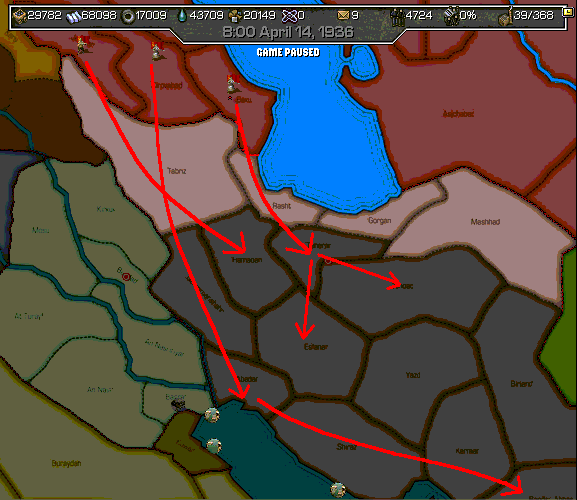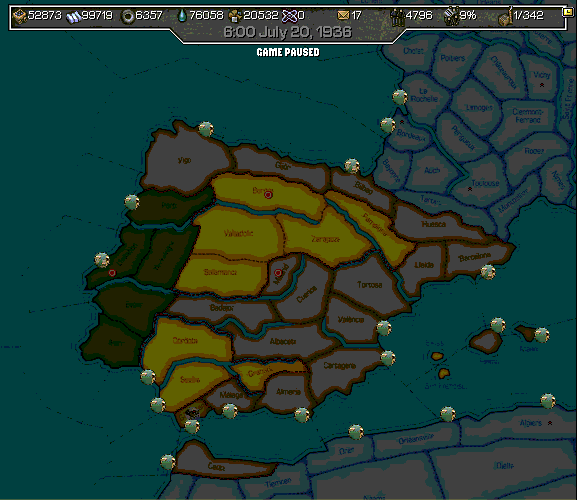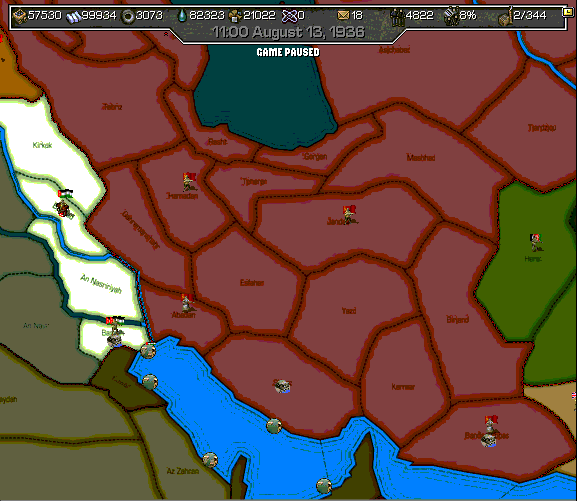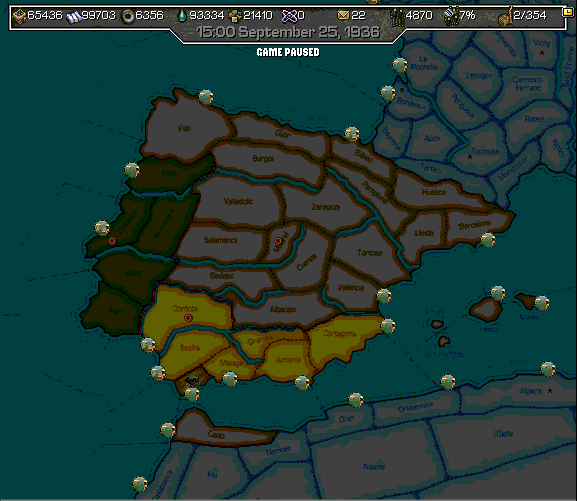*Inspired by my first AAR ever*
Difficulty and AI Aggressiveness: Regular
Version: Combination of regular 1.05c, CORE 0.64 and CORE 0.8. Slight modifications have been made to prevent A-Bombs from being used.
January 5th, 1943
Inside a concrete bunker deep within New York City, a shimmering blue rift appeared, through which three men, one being dragged along by the others, entered. Instantly, the portal closed, and the scientists crowded together to see the arrivals.
The two men roughly threw the other man to the ground. One of the scientists stepped forward to look at him.
"Stukov! I should have known it was you!" growled the man.
Stukov remained silent, trembling with rage.
The scientist turned to face the others, "We've caused enough problems. Destroy the equipment and tell no one of what happened here."
For a decade, these scientists had been working together to create something of a time machine. Funded by the U.S. government, it was the single most top secret project on the entire planet. But one of the scientists, Alexei Stukov, used the time machine to travel to 1936, where he assassinated Hitler and assumed his place. But Stukov had been careless, and had allowed the project to continue. Thus, the scientists had travelled back to 1936 as well and had stopped Stukov before he could ever start his war of world domination.
The scientist turned back to Stukov, "As for you, you will be locked away in prison, where you won't cause any more trouble."
With that, Stukov was lifted up to his feet and dragged towards the door. With his scheme ruined, he no longer had the energy to struggle, or even utter a word.
One of the scientists , shorwded by the shadow of a massive computer bank, pulled a pistol from his coat pocket. Unnoticed, the man leveled his gun and fired off the entire clip into his colleagues. Seven shots had been fired, and eight men had been killed. The scientists lay on the ground, a bullet through each of their heads. Blood was splattered across the room, giving it a gruesome appearance. Stukov slowly turned to face the murderer, stunned at what had transpired in the last few seconds.
The man chuckled, "You get a second chance, comrade," the man said in Russian, shocking Stukov, who had known the man for a decade as an American scientist born in the American heartland.
"I take it you're not the man you appear to be," said Stukov.
The man shook his head, "No, I replaced him a few months ago when the remains of the NKVD learned of this project."
"Remains of?" Stukov asked.
The NKVD agent laughed, "I suppouse you don't know of how much damage you did before you were stopped. You cannot succeed with Germany. But you can with another."
Stukov raised an eyebrow, "Are you suggesting what I think you are?"
The man nodded, handing Stukov a case filled with documents, "You might find these helpful."
Stukov browsed through the papers, "How do you know all this?" he asked.
The agent smiled and winked, "Have faith, all will be revealed in due time."
Without warning, a blinding flash of light filled the small, bloody room, consuming the man. Stukov shielded his eyes, but the light vanished almost instantly, leaving Stukov alone with the dead.
Shocked, Stukov read through the documents and tossed them to the ground. He began activating several banks of computers. A droning hum filled the room and a familiar blue rift appeared in the room. Taking a deep breath, Stukov hesitated, knowing this was his last chance. Without another word, he stepped into the rift and dissapeared.
January 1st, 1936
Stalin stood with his hands held at the small of his back, looking out the window of his Kremlin home. The snow was falling heavily, not unusual for this time of year.
From behind him, an eerie blue light drapped the room. Startled, Stalin whirled around. Standing before him was a man outlined by the bright blue light. The rift abruptly vanished and the man was swallowed in darkness.
The man spoke, "Greetings comrade Stalin, we have much to discuss."
Difficulty and AI Aggressiveness: Regular
Version: Combination of regular 1.05c, CORE 0.64 and CORE 0.8. Slight modifications have been made to prevent A-Bombs from being used.
January 5th, 1943
Inside a concrete bunker deep within New York City, a shimmering blue rift appeared, through which three men, one being dragged along by the others, entered. Instantly, the portal closed, and the scientists crowded together to see the arrivals.
The two men roughly threw the other man to the ground. One of the scientists stepped forward to look at him.
"Stukov! I should have known it was you!" growled the man.
Stukov remained silent, trembling with rage.
The scientist turned to face the others, "We've caused enough problems. Destroy the equipment and tell no one of what happened here."
For a decade, these scientists had been working together to create something of a time machine. Funded by the U.S. government, it was the single most top secret project on the entire planet. But one of the scientists, Alexei Stukov, used the time machine to travel to 1936, where he assassinated Hitler and assumed his place. But Stukov had been careless, and had allowed the project to continue. Thus, the scientists had travelled back to 1936 as well and had stopped Stukov before he could ever start his war of world domination.
The scientist turned back to Stukov, "As for you, you will be locked away in prison, where you won't cause any more trouble."
With that, Stukov was lifted up to his feet and dragged towards the door. With his scheme ruined, he no longer had the energy to struggle, or even utter a word.
One of the scientists , shorwded by the shadow of a massive computer bank, pulled a pistol from his coat pocket. Unnoticed, the man leveled his gun and fired off the entire clip into his colleagues. Seven shots had been fired, and eight men had been killed. The scientists lay on the ground, a bullet through each of their heads. Blood was splattered across the room, giving it a gruesome appearance. Stukov slowly turned to face the murderer, stunned at what had transpired in the last few seconds.
The man chuckled, "You get a second chance, comrade," the man said in Russian, shocking Stukov, who had known the man for a decade as an American scientist born in the American heartland.
"I take it you're not the man you appear to be," said Stukov.
The man shook his head, "No, I replaced him a few months ago when the remains of the NKVD learned of this project."
"Remains of?" Stukov asked.
The NKVD agent laughed, "I suppouse you don't know of how much damage you did before you were stopped. You cannot succeed with Germany. But you can with another."
Stukov raised an eyebrow, "Are you suggesting what I think you are?"
The man nodded, handing Stukov a case filled with documents, "You might find these helpful."
Stukov browsed through the papers, "How do you know all this?" he asked.
The agent smiled and winked, "Have faith, all will be revealed in due time."
Without warning, a blinding flash of light filled the small, bloody room, consuming the man. Stukov shielded his eyes, but the light vanished almost instantly, leaving Stukov alone with the dead.
Shocked, Stukov read through the documents and tossed them to the ground. He began activating several banks of computers. A droning hum filled the room and a familiar blue rift appeared in the room. Taking a deep breath, Stukov hesitated, knowing this was his last chance. Without another word, he stepped into the rift and dissapeared.
January 1st, 1936
Stalin stood with his hands held at the small of his back, looking out the window of his Kremlin home. The snow was falling heavily, not unusual for this time of year.
From behind him, an eerie blue light drapped the room. Startled, Stalin whirled around. Standing before him was a man outlined by the bright blue light. The rift abruptly vanished and the man was swallowed in darkness.
The man spoke, "Greetings comrade Stalin, we have much to discuss."





